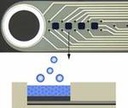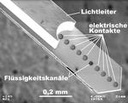
New publication in Micromachines from the Laboratory for Biomedical Microtechnology

New publication in Micromachines from the Laboratory for Biomedical Microtechnology

Successful invention at the Laboratory for Biomedical Microtechnology

Thomas Stieglitz as guest at Case Western Reserve University

Podcast on current topics in neurotechnology with a participant from Freiburg

What does microsystems engineering look like in the future and how will it change our lives? Reading of a science fiction story by Thomas Stieglitz
Freiburg researchers develop guidelines to standardize analysis of electrodes

Benedikt Szabo from the Professorship for Biomedical Microtechnology wins a prize in the student competition

About prosthetic care in Germany

Facing the challenge: from fundeamental research to clinical trials

"Leg prothesis with sensory feedback" – Publication in Science Translation Medicine

Researchers are testing a prosthetic leg that gives amputees sensory feedback and makes walking easier

Researchers from the Laboratory for Biomedical Microtechnology are designing a prosthesis that makes movements tangible – Film!

Cover article of Micromachines on the integrity assessment of a hybrid DBS probe

Researchers are developing coding that allows patients to feel and move more naturally

The Laboratory of Biomedical Microtechnology with numerous contributions on international conference

The department for Biomedical Microtechnology is well represented on this year´s EMBC in Hawaii

Cover article of Advanced Biosystems on the development of innovative adhesion promoters for enhanced stability in thin-film glassy carbon ECoG arrays

New review article from the Laboratory for Biomedical Microtechnology on the deployment of MRT in patients with brain implants, published in the Journal of Neural Engineering

Johannes Erhardt from the Laboratory for Biomedical Microtechnology explores the behavior of implants in magnetic resonance tomography (MRT)

A new technology uses electrical impulses to reduce high blood pressure and is set to become the first alternative to treatment with drugs

First long-term stabile brain implant developed based on an anti-inflammatory coating

Development of a high-dimensional brain machine interface, Tuesday, June 21st 2016, 4pm

Aesculap AG agrees to participate in neuroloop GmbH and invest in a University of Freiburg spinoff

Ordonez, Group Leader at the Biomedical Microtechnology Lab, was appointed as Junior Research Fellow at the Freiburg Institute for Advanced Studies (FRIAS). His research proposal “A novel mechanical model for safe electrical stimulation” targets a fundamental and innovative reliability model for implantable thin-film electrodes under electrochemical loads.

His original and scientifically relevant project proposal entitled “Effects of neuroprosthetic intervention’ is one out of 20 selected ideas to be discussed and elaborated within a 1-week multidisciplinary workshop together with multiple experts in the field.

High blood pressure is the greatest health risk worldwide behind smoking and alcohol consumption. In Germany, around 25 percent of the population suffers from arterial hypertension, as the condition is referred to in medical circles. The microsystems engineers Dr. Dennis Plachta and Prof. Dr. Thomas Stieglitz from the Laboratory of Biomedical Microtechnology at the Department of Microsystems Engineering (IMTEK) of the University of Freiburg teamed up with the neurosurgeons Dr. Mortimer Gierthmühlen and Prof. Dr. Josef Zentner from the Medical Center – University of Freiburg to develop a new cuff equipped with electrodes that can lower blood pressure without causing side effects.

Freiburg researchers have developed electrodes that help amputees to grasp at objects

Scientists from Freiburg Build a Microimplant that Uses a Laser to Control Individual Nerve Cells

Document Actions